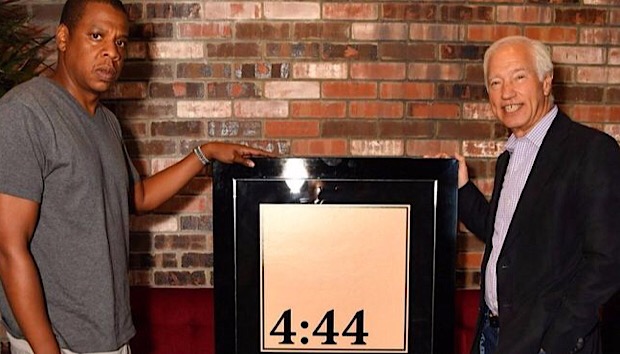Jay-Z’s 13th studio album arrived abruptly after a series of mysterious visuals that felt like movie trailers. Not surprising from a man who rarely does anything that isn’t film-like in its scope or delivery. And rather than spam us with filler and throw away features, Jay-Z spends a shade under 40 minutes (mostly) alone, delivering 4:44, the strongest record in his catalog since 2003’s The Black Album.
There’s a transparency in this project that has eluded Jay-Z for years. His ego has often been the driving force for many of his mid-career albums where he’s relied solely on his reputation and confidence, and the results have been lackluster (think Kingdom Come and The Blueprint 3). On 4:44 his guard is down, and that vulnerability is a welcomed twist to the Shawn Carter saga.
“Kill Jay-Z” dives into lost friendships in and out of the industry, while “Smile” bravely describes his mother’s struggle to reveal that she is a lesbian. There’s a soul-searching element to this release that could have only come from a 47-year old legend taking a long, hard look in the mirror, where he’s forced to confront his private inner circle drama and boldly announce that, “nobody wins when the family feuds.”
4:44 strays far from the chart seeking sounds of Jay’s last few records or anything in contemporary rotation, leaning entirely on exclusive production from Chicago’s No I.D., who values crate-digging over pop trends. The record’s intimate moments, ones where Jay fades into the shadows and lets the tracks carry themselves, creep up and down our spines with samples from Stevie Wonder, Nina Simone, Lauryn Hill, and Hannah Williams. The album feels grown, because it is a grown man’s business move in every sense of the word.
While many will argue that 2017 for Jay-Z marked a heartfelt turn towards the introspective and apologetic (possibly a nod to Beyonce’s Lemonade), let us never forget who we are dealing with. Shawn Carter is a master salesman. His business acumen is as proficient and prolific as his skills with a microphone. 4:44 was released to Sprint customers by providing them a code for a free Tidal membership. Jay-Z’s most personal record to date, one whose title track deals directly with his infidelity and shortcomings as a partner, was packaged and fed to the masses via corporate America, where Jay’s largest claims are staked. Sleazy? Maybe. Brilliant? Most definitely.
One thing is certain on all 10 of these tracks. The business of rapping is still the business for Hov. While he is aging, and his cadence is at times at odds with the soulful production, Jay has never been as sharp as he is on “The Story of O.J.” and “Caught Their Eyes,” where he raps “I sat down with Prince, eye to eye. He told me his wishes before he died. Now, Londell McMillan, he must be color blind. They only see green from them purple eyes.”
It’s clear that Jay-Z the observer is as present on 4:44 as Jay-Z the performer. He openly critiques his shortcomings and the shortcomings of America in 2017. 4:44 is full of bold, honest moments that would never have surfaced a decade ago, where lavish, excessive brags were the currency of all successful rappers. But is his message muddled?
Now that money and fame are no longer his sole motivation, Jay has the chance to provide a blueprint for his legacy. While laying down game and shaking up our preconceived notions of what success truly means to Jay-Z, the realities and revelations so eloquently dissected and explored on 4:44 are still wildly out of reach for those outside the one percent. To many, holding stacks of money to ears is still money over here. Either way, 4:44 is an intimate, career defining moment for a true rap giant who is still managing to get the world buzzing with every little step.






